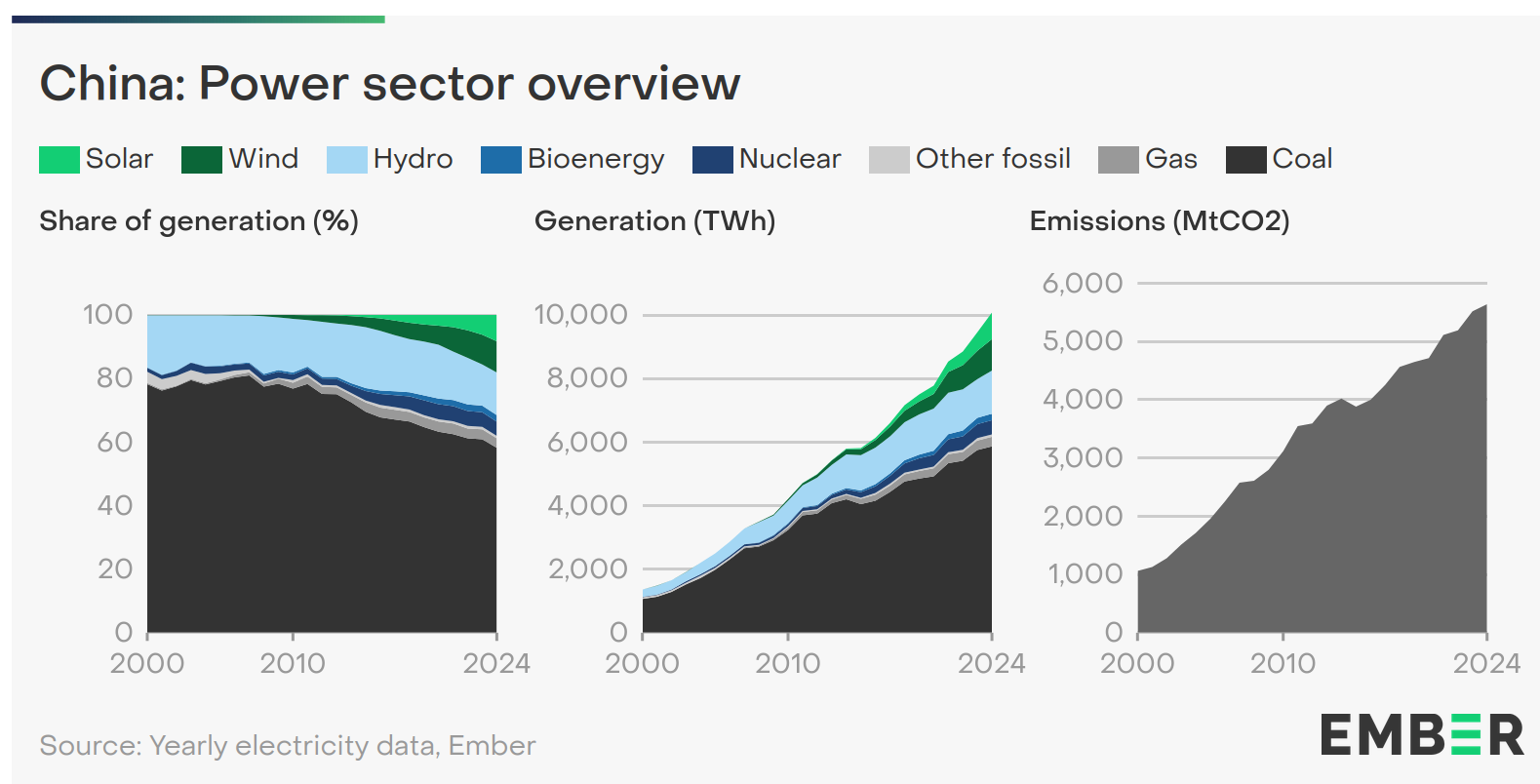Last year China generated almost 3 times as much solar power as the EU did, and it's close to overtaking all OECD countries put together (whose combined population is 1.38 billion people)
-
I think they don't get that your comment is fighting the same fight by being pro solar & anti coal/gas.
Unless you meant keeping the coal and gas plants, which really should be turned off and ended at this point. They're just sources of lung cancer & emissions
No. We get exactly what his comment is about.
If he was in the renewables camp, there would be no point, in this discussion over solar, to bring up nuclear. It's absolutely unrelated.
What he's doing is pushing the thought into people's heads that nuclear is a good solution, and that's why I'm calling him out for. For being a shill.
-
Yes, of course I've meant it in a positive way - a way to replace coal and gas. But solar is not just positive, they are problematic when you couple them with nuclear for the simple reasons that solar is not reliable and you can't throttle nuclear - they are like big ships, they require a lot of time to steer. Furthermore solar energy low price causes problems for nuclear higher prices. Which wouldn't be a problem if solar was reliable and continuous (long winter nights much?). But it's not, but you still need a reliable energy source. And so on.
The pro solar panel crowd don't understand many of these implications and go with simple "idiotic" and downvotes.Why wouldn't solar and other renewables combined with batteries be better?
It's very early days, yet California recently had 98 days on renewables. That started in winter.
What is it about renewables with batteries that you believe will fail, despite the mass adoption that is under way?
Why will the projected, continued decline in battery prices and advances in battery tech not occur?
Why would adjacent solutions, like the massive storage ability of vehicle-to-grid, be worse compared to nuclear?
Why are so many "in the know" getting it so wrong?
-
No. We get exactly what his comment is about.
If he was in the renewables camp, there would be no point, in this discussion over solar, to bring up nuclear. It's absolutely unrelated.
What he's doing is pushing the thought into people's heads that nuclear is a good solution, and that's why I'm calling him out for. For being a shill.
I'm with you on solar. We literally have a fusion reactor at the core of our solar system, so there's no point in having ones on earth. And the more we use solar, the more it'll be improved through research.
There's no argument for any carbon based fuels
-
People talk about China's energy use like it's not* their* energy use. They used that power to produce the stupid shit that you bought, dumbass. You're responsible for that energy use, despite it being generated in China.
This is legit true IDK why you're getting downvoted. Just because it doesn't show on US energy usage, every time you buy stupid shit you don't need like an automatic corn dog maker or a taco holder shaped like a sombrero that holds a shot glass in the middle, that has a real cost in terms of CO2 and that is done in China.
-
This is legit true IDK why you're getting downvoted. Just because it doesn't show on US energy usage, every time you buy stupid shit you don't need like an automatic corn dog maker or a taco holder shaped like a sombrero that holds a shot glass in the middle, that has a real cost in terms of CO2 and that is done in China.
i think I need an automatic corn dog maker and a taco holder shaped like a sombrero that holds a shot glass in the middle
-
Last year, China generated 834 terawatt-hours of solar power.
Which is more than the G7 countries generated, and more than the US and EU combined. In fact the only country group that generates more solar power than China is the OECD, all 38 countries of it.
Data:
@ember-energy.orgSource: https://bsky.app/profile/nathanielbullard.com/post/3lsbbsg6ohk2j
Good for China on that!
To add some perspective, China is about 2 and a quarter times as large as the EU nations, and according to currentresults.com seems to get a bit more sunshine than the EU does. So the difference isn't quite as stark as this post makes it seem.
But still, it's good that China is taking solar power seriously. I didn't realize they were doing that well.
-
i think I need an automatic corn dog maker and a taco holder shaped like a sombrero that holds a shot glass in the middle
I immediately went looking on temu

I don't the poster meant to happen!
-
Why wouldn't solar and other renewables combined with batteries be better?
It's very early days, yet California recently had 98 days on renewables. That started in winter.
What is it about renewables with batteries that you believe will fail, despite the mass adoption that is under way?
Why will the projected, continued decline in battery prices and advances in battery tech not occur?
Why would adjacent solutions, like the massive storage ability of vehicle-to-grid, be worse compared to nuclear?
Why are so many "in the know" getting it so wrong?
What batteries are you referring to? Do you realize the amount of energy those batteries would have to store? Perhaps somewhen in the not so near future, but today? Go ahead and show me a western city able to store a couple of days worth of energy. More realistically a week.
-
China also continues to increase coal generation by more than renewables.
I don't believe this:


China | Energy Trends | Ember
Explore the latest data on China’s energy transition. How clean is China's electricity? How much renewable electricity does China generate?

Ember (ember-energy.org)
In 2024, China approved 66.7GW of new coal-fired capacity, started construction on 94.5GW of coal power projects
Even if you add these 2 together and pretend they were finished the same year it's not even close to:
China’s renewable energy sector made remarkable progress in 2024, adding 356 gigawatts (GW) of wind and solar capacity

China’s Energy Production: Coal and Renewables Locked in Competition Amid Clean Energy Boom
China’s energy production strategy in 2024 has been marked by both an unprecedented surge in renewable energy and a persistent reliance on coal, according to a new analysis by two think tanks, the Global Energy Monitor and the Centre for Research on Energy and Clean Air (CREA).

The Asia Live (theasialive.com)
They have missed every single renewable target and goal they’re set.
I don't believe this is true either unless you are referring to some other targets?
In 2020, China set a goal to install at least 1,200 gigawatts (GW) of solar and wind power by 2030. By the end of 2024, China had already surpassed this target, reaching this milestone 6 years ahead of schedule. This was made possible by aggressive investments, government policies, and a surge in solar and wind installations.
China’s solar capacity grew by an incredible 45.2% in 2024, adding 277 GW. Wind capacity also saw a strong increase of 18%, with an additional 80 GW installed. Overall, total power generation capacity rose by 14.6% in 2024, driven mainly by renewables.

China’s Renewable Energy Boom: A Record-Breaking Shift or Still Chained to Coal?
China has surpassed its 2030 renewable energy goal six years early, leading global clean energy growth. But coal reliance remains a challenge.

Carbon Credits (carboncredits.com)
China is only %27 renewables while the EU is 47%.
Don't worry, just like everything else I'm sure that will flip in the future
Europe has plenty of money apparently to suddenly:
NATO leaders on Wednesday confirmed their commitment to more than double defence spending by 2035 banding words like "crucial", "momentous" and "quantum leap"

Defence up to 5% GDP, Ukraine, Russia: Key takeaways from NATO summit
The summit ended with a commitment to spend 5% of GDP on defence - more than double the current target of 2%.

euronews (www.euronews.com)
Just why does it take an emergency to make some proper progress:
Global energy storage owner-operator BW ESS and Spanish energy storage developer Ibersun say a new joint venture is intended to build eight four-hour battery projects across the country, with a combined capacity of 2.2 GW, 8.8 GWh.

“No time to waste:” Huge big battery plans unveiled for Spain as accusations traded over blackout
Two battery storage companies unveil plans for eight big projects in Spain, as the government, regulator and power companies trade accusations over cause of blackout.

RenewEconomy (reneweconomy.com.au)
Where will the batteries be made I wonder?
On top of this energy prices in the EU are ridiculous and for some reason they still can't get off the gas, which leads to an unreal point of France giving more money to Russia for gas than in aid to Ukraine, so they have high energy prices and they're funding Russia's invasion of Ukraine and their companies and manufacturing are leaving them... to go to China...

Eurozone business activity almost flat again in June - Aussie Zone
> “The eurozone economy is struggling to gain momentum. For six months now, growth has been minimal, with activity in the service sector stagnating and manufacturing output rising only moderately,” Cyrus de la Rubia, chief economist at Hamburg Commercial Bank. >“In Germany, there are signs of a cautious improvement in the situation, but France continues to drag its feet”. >The expansion in the 20-country currency area was centred on the manufacturing sector, where production increased for the fourth successive month, according to the survey.

(aussie.zone)
But I appreciate your scepticism (I gave your post an upvote because China does sometimes get a little bit too much credit), they are the worlds top producer of CO2 by FAR but I do want to address
Greenwashing
This is something I've wanted for a while:
It requires EU importers to pay a levy corresponding to the embedded carbon emissions in 303 emission-intensive products
I've long disliked that places like the EU and the rest of the west can export their dirty manufacturing over to China where companies take advantage of lax or no environmental regulations, it's a false economy and makes the west look a whole lot greener and cleaner than it would if we were manufacturing what we used back at home
‘China has Apple by the balls’: How the rising superpower captured the tech giant
‘China has Apple by the balls’: How the rising superpower captured the tech giant
Apple Inc reaped staggering profits by outsourcing its manufacturing – but its “epic” technology transfer has consequences, says one long-time observer.
The Sydney Morning Herald (www.smh.com.au)
edit: boy I sure do love to procrastinate and talk about energy and co2 instead of studying

China approved 66.7GW of new coal-fired capacity, started construction on 94.5GW of coal power projects
New power plants don't mean using those power plants. Resilience/backup power. Use of coal for electricity has declined despite new coal plants.
-
Last year, China generated 834 terawatt-hours of solar power.
Which is more than the G7 countries generated, and more than the US and EU combined. In fact the only country group that generates more solar power than China is the OECD, all 38 countries of it.
Data:
@ember-energy.orgSource: https://bsky.app/profile/nathanielbullard.com/post/3lsbbsg6ohk2j
They also expanded coal power, roads, and removed their population limiting policies, though. They produce about 3 times as much CO2 per person as India, Indonesia, and many South American nations, likely many nations in Africa as well but theres a lot of missing data.
-
They‘ll keep building more coal power plants in the global south and export coal. There‘s a lot of money to be made.
They're also actually still building more coal power in mainland China.
-
The question is simple. If you have installed solar power of 40% your country peak use, how much nuclear power you need - assuming simplified you have only these two power sources.
In a market or effincient economy, where peak occurs mid hot summer day, 100% solar dominated renewables makes sense. In Spring and fall, EVs can absorb daily oversupply and profit from trading back at night. Winter is when solar can fail to meet heating and electricity needs, and so either backup energy sources or having much more than 100% peak demand in order to make green H2 that can be exported to where it gets cold is needed.
0 new nuclear is best amount of nuclear for any economy.
-
What batteries are you referring to? Do you realize the amount of energy those batteries would have to store? Perhaps somewhen in the not so near future, but today? Go ahead and show me a western city able to store a couple of days worth of energy. More realistically a week.
OP sepcifically mentioned EVs. This sector is deflationary even in US, where better value/performance cars cost less every year. More dramatic deflation in less corrupt countries. Australia home solar costs under 1/3rd of US due to different politico-social corruption levels.
EVs and home solar are a great match that permits going offgrid at substantially lower cost if an EV is parked at home during day. That same dynamic allows a society/community to power itself through solar+batteries, and EVs parked at work. It's not a question of look at our corrupt obstructionist oligarchical monopoly state of societies for examples of lack of economic success as proof that it will forever be impossible.
-
Yes, of course I've meant it in a positive way - a way to replace coal and gas. But solar is not just positive, they are problematic when you couple them with nuclear for the simple reasons that solar is not reliable and you can't throttle nuclear - they are like big ships, they require a lot of time to steer. Furthermore solar energy low price causes problems for nuclear higher prices. Which wouldn't be a problem if solar was reliable and continuous (long winter nights much?). But it's not, but you still need a reliable energy source. And so on.
The pro solar panel crowd don't understand many of these implications and go with simple "idiotic" and downvotes.The idiot digs deeper, and shows his true colours. Asinine.
-
People talk about China's energy use like it's not* their* energy use. They used that power to produce the stupid shit that you bought, dumbass. You're responsible for that energy use, despite it being generated in China.
So you're saying we should stop trading with China?
-
What batteries are you referring to? Do you realize the amount of energy those batteries would have to store? Perhaps somewhen in the not so near future, but today? Go ahead and show me a western city able to store a couple of days worth of energy. More realistically a week.
Las Vegas has already achieved 97% storage supply for its needs - a city that barely sleeps at night.
Again, where is your evidence that it is not going to improve across the board, and will all fail?
"It's not all happening right now," is not even close to a convincing answer. If that was the reason to exclude any technology, there'd be none.
And it's an especially ironic answer given that it takes up to 20 years to commission a nuclear power plant. And they are down for scheduled maintenance for up to a month a year, etc.
-
Last year, China generated 834 terawatt-hours of solar power.
Which is more than the G7 countries generated, and more than the US and EU combined. In fact the only country group that generates more solar power than China is the OECD, all 38 countries of it.
Data:
@ember-energy.orgSource: https://bsky.app/profile/nathanielbullard.com/post/3lsbbsg6ohk2j
Amazing how fast you can build stuff when there's safety standards, no environmental regulations, no labour rights and the government can expropriate property without a time consuming legal process!
Though I think a prefer living in a country where I have rights even if it takes a bit longer to build stuff.
-
Amazing how fast you can build stuff when there's safety standards, no environmental regulations, no labour rights and the government can expropriate property without a time consuming legal process!
Though I think a prefer living in a country where I have rights even if it takes a bit longer to build stuff.
We tried getting rid of environmental regulations, safety standards, labour rights, etc. in America and I'm still waiting for when stuff gets built faster... At least the government can't expropriate property! oh wait... Well at least we still have our rights? oh wait...
-
We tried getting rid of environmental regulations, safety standards, labour rights, etc. in America and I'm still waiting for when stuff gets built faster... At least the government can't expropriate property! oh wait... Well at least we still have our rights? oh wait...
I think you call it eminent domain in the US. But I think it can still be challenged in court, but wait a couple months.
Yes, the US is becoming China. You put a guy into power that admires Xi Jinping for the same reason China made Xi President for life: wanted a strongman to run the economy and protect you from evil foreigners. And now you're getting corporate socialism, just like China has.
-
What batteries are you referring to? Do you realize the amount of energy those batteries would have to store? Perhaps somewhen in the not so near future, but today? Go ahead and show me a western city able to store a couple of days worth of energy. More realistically a week.
It's not perfect so it must be bad! Hot take. Fuck off with your green energy negging. You're a paid assassin or an idiot. Doesn't really matter which. Good day








